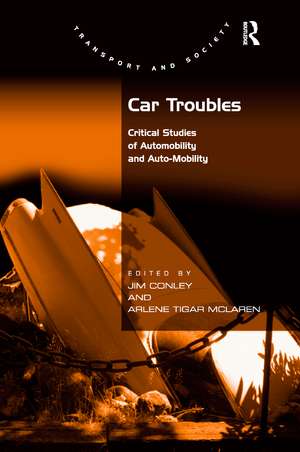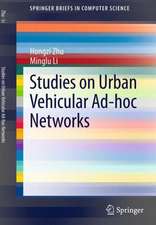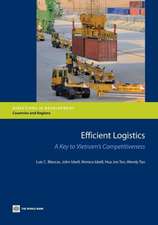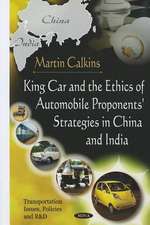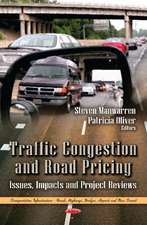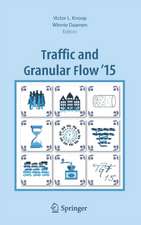Car Troubles: Critical Studies of Automobility and Auto-Mobility
Autor Jim Conley Editat de Arlene Tigar McLarenen Limba Engleză Paperback – 11 noi 2016
| Toate formatele și edițiile | Preț | Express |
|---|---|---|
| Paperback (1) | 459.90 lei 43-57 zile | |
| Taylor & Francis – 11 noi 2016 | 459.90 lei 43-57 zile | |
| Hardback (1) | 1033.34 lei 43-57 zile | |
| Taylor & Francis – 28 iul 2009 | 1033.34 lei 43-57 zile |
Preț: 459.90 lei
Nou
Puncte Express: 690
Preț estimativ în valută:
88.02€ • 91.43$ • 73.11£
88.02€ • 91.43$ • 73.11£
Carte tipărită la comandă
Livrare economică 03-17 februarie 25
Preluare comenzi: 021 569.72.76
Specificații
ISBN-13: 9781138255340
ISBN-10: 1138255343
Pagini: 272
Dimensiuni: 156 x 234 x 23 mm
Greutate: 0.45 kg
Ediția:1
Editura: Taylor & Francis
Colecția Routledge
Locul publicării:Oxford, United Kingdom
ISBN-10: 1138255343
Pagini: 272
Dimensiuni: 156 x 234 x 23 mm
Greutate: 0.45 kg
Ediția:1
Editura: Taylor & Francis
Colecția Routledge
Locul publicării:Oxford, United Kingdom
Notă biografică
Jim Conley is an Associate Professor in the Department of Sociology at Trent University, Peterborough, Canada. Arlene Tigar McLaren is Professor Emerita in the Department of Sociology and Anthropology at Simon Fraser University, Burnaby, Canada.
Recenzii
'This collection of lively and engaging studies drives home to devastating effect and from different political, material, cultural and social directions, the fundamental contradiction of the car; that it destroys the very environment it makes accessible.' Tim Dant, University of Lancaster, UK 'Car Troubles shows brilliantly how far we have come since Wolfgang Sachs claimed that the "problem with the automobile is that the automobile is not a problem". It gives rich, diverse insights into our problematisation of the car, and into the complex politics of dealing with the problems cars cause.' Matthew Paterson, University of Ottawa, Canada
Cuprins
Introduction, Jim Conley, Arlene Tigar McLaren; Part 1 Cultures of Automobility; Chapter 1 T-Bucket Terrors to Respectable Rebels: Hot Rodders and Drag Racers in Vancouver BC, 1948–1965, Catharine Genovese; Chapter 2 Automobile Advertisements: The Magical and the Mundane, Jim Conley; Chapter 3 SUV Advertising: Constructing Identities and Practices, Fiona McLean; Chapter 4 Bad Impressions: The Will to Concrete and the Projectile Economy of Cities, Derek Simons; Part 2 Risk and Regulation; Chapter 5 The Safety Race: Transitions to the Fourth Age of the Automobile, David MacGregor; Chapter 6 Implementing Restraint: Automobile Safety and the US Debate over Technological and Social Fixes, Jameson M. Wetmore; Chapter 7 ‘Mind That Child’: Childhood, Traffic and Walking in Automobilized Space, Damian Collins, Catherine Bean, Robin Kearns; Part 3 Inevitable Automobility?; Chapter 8 The Politics of Mobility: De-essentializing Automobility and Contesting Urban Space, Jason Henderson; Chapter 9 The Chilean Way to Modernity: Private Roads, Fast Cars, Neoliberal Bodies, Ricardo Trumper, Patricia Tomic; Chapter 10 Driven to Drive: Cars and the Problem of ‘Compulsory Consumption’, Dennis Soron; Part 4 Beyond the Car; Chapter 11 Mobility as a Positional Good: Implications for Transport Policy and Planning, Todd Litman; Chapter 12 The Global Intensification of Motorization and Its Impacts on Urban Social Ecologies, George Martin; Chapter 13 Post-Car Mobilities, Kingsley Dennis, John Urry;
Descriere
Car Troubles examines a wide range of issues that are central to automobility by situating it within social, economic, and political contexts, and by combining social theory, specific case studies and policy-oriented analysis. It examines obstacles to change and considers the possibility of alternatives that go beyond the car.
